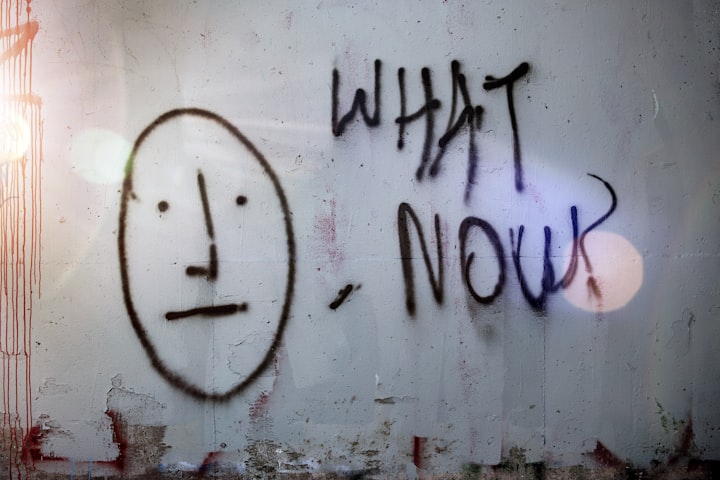My Experience of Parenting with Mental Illness
Parenting with mental illness is not easy, and this story is written from my personal experience.

Being a parent is a huge responsibility, but for someone with mental illness, it can be very difficult. I became a parent at just eighteen years old, it wasn't planned and I had no idea I was pregnant. I had never been taught about pregnancy, contraception or child birth, so as you can imagine, I was in shock.
I was four months pregnant with my first child when I found out. I woke up several mornings in a row feeling sick. I knew I had missed my periods, but my periods were irregular any, and I put the sickness down to a virus as I had no idea what pregnancy was. It was only because a friend suggested that I could be, and encouraged me to do a test, that I actually discovered the shock. I wasn't ready for the news, so I took the test at a pregnancy crisis center.
I sat in the room for hours before they told me. When I was told that I was pregnant, I cried and collapsed in a heap. My relationship with my partner was not stable back then, so I didn't know what to do. However I gained enough confidence to keep my baby, but I was not ready for the rollercoaster ride that followed.
I had a boy, and initially, after a long seven-hour labor I was thrilled. However, that didn't last long, as I found myself crying all the time, panicking, and also feeling suicidal. This was initially put down to the 'baby blues' by professionals, though shortly afterward my relationship with my partner had also hit the rocks, and become unstable. I found myself desperate to get out of that relationship, which also turned violent at times, but I didn't know how to or have anywhere to go, so I chose to put up with it. It did stabilize for a while, and I found myself pregnant with a second child.
Shortly after my second child was born, my council had to move me because I needed more space. At the time I was still vulnerable with what was thought to be depression, very sensitive and I had a fear of standing up for myself because I was already made vulnerable by my situation at that time. They moved me to an area that was rife with crime, drug dealers and teenagers who joined in with the crime. My partner reacted badly to this, which caused me a further problem, and my house was smashed up, and we were forced into a hostel.
Shortly after this, I was offered a maisonette which I thought was perfect for us. However, I split with my partner shortly after and things went from bad to worse. The council at that time had shown me around the area during the day, and it seemed a nice place. After I became a lone parent, this changed and I was brutally attacked in front of my children, raped, broken into, mugged in the street, among many other things a parent who was emotionally sensitive should never have had to go through.
After this, I was moved into a women's aid hostel which was not pleasant at all. I couldn't tell anyone where I was, not even the social worker involved with me. I was only allowed to work with the 'in-house social workers' and key-workers' supporting me. I had to share a fridge, freezer, kitchen, and lounge. Food for my children was stolen, as was my benefits cheques. Also, many of these people had drug issues. I left with my children in the end and got a house near a member of my family. However, I ended up leaving again, after I was broken into and raped.
When I tried reporting this to my local authority, they blamed me for what was happening and 'not doing anything about it.' However, a lot of these things happened 'behind closed doors' and I was living in fear of my life and my children's lives. I was very scared of these people, but instead of being helped. I got the blame.
A few years later, I was taken into hospital and my children were removed from my care. I started self-harming, having flashbacks, panic attacks, crying and scrubbing myself until I was sore. I was also extremely underweight and dirty because by this point, my money had stopped and I had nowhere to live. I was like this for many months before I got a diagnosis. However my diagnosis kept changing from Postnatal depression, anxiety to Borderline Personality Disorder and back to Postnatal depression.
I did, however, recover for a few years, and I settled down with a partner, got my children back and had more children with my partner. However, after my last pregnancy, I became very ill again. During that last pregnancy, I spent months in a wheel chair as my pelvic bone fractured during pregnancy, and I could not walk. I had a C-section birth, but I lost a lot of blood, and my blood pressure went extremely low which made the pregnancy very traumatic. I did get well, and for a few years I managed to stay stable, but then a bad argument broke out on my street, and it sent me straight back to the past. My children were taken from me again because sadly the trauma was coming out in front of the children, and I could not control it.
Eventually, I was diagnosed with Emotionally Unstable Personality Disorder and Post Traumatic Stress Disorder. I was given medication and therapy, which I completed all but three sessions, due to the fact that I had been diagnosed with a viral infection and was sick, and also because of other appointments, I had to attend to do with the children. I found this very unfair because it was like saying I was not allowed to be there for my children because I was ill, which is stigmatizing to a parent with mental illness. However, I continue with the skills from this therapy called Dialectal Behavioural Therapy today because they do help me.
Happily for me, my husband and my family. I am more stable today and no longer suicidal. In fact, one of my children has been returned, I have shared care with another, and regular contact with the others. I can now get through my day with no major trauma, and I am doing courses centered around helping children and parents who have been traumatized by mental illness and violence. My goal is to go on and help these families. I will always have traits of my illness, but it no longer means that I am not fit enough to be a parent.
Parenting with mental illness is very difficult, especially the type of illness I have dealt with. EUPD is a type of BPD but without the 'borderline traits.' It consists mostly of emotional dysregulation, self-harm, mood swings, distorted thinking, impulsive decisions. When it is combined with PTSD, some of the flashbacks can come out in front of the children, which can be very traumatizing not just for them, but also for the parent going through it. It does not mean that that person will be violent, this can be a trait of the illness in some, but not in others. DBT can help someone with this illness by teaching helpful things such as mindfulness, focusing, acceptance, self care, and assertiveness skills. When I did these things repeatedly, I was able to unlearn the unhealthy ways of coping such as self-harm, that I had learned in the past as the way to deal with the illness.
When you are a parent with EUPD and PTSD, it is important to take time out to look after yourself both physically and emotionally. This is because the illness can send you straight back into dysregulation which can make you tired and unable to focus on your family too.
I was often labeled 'crazy' for my illness, and this is stigmatizing, especially to a parent who has been through a lot of trauma. This is not the parent's fault, and they are not 'crazy.' It is a misunderstanding of the way the illness is portrayed through media and also because there are people in society who have never been through it, therefore they will not understand what it is like to live with it. I started talking about my illness openly and also talking about my family. It took a while, but people did start to think differently and see me as a 'normal' person who has just been through a lot of trauma. It is important to talk to your partner and your children about this too because children do find it scary to see someone behave in ways that contradict societal 'norms.' Talking about it can make it less scary for them, and they will learn that it is ok to ask for help when you're unwell on the 'inside.'
Most importantly, be a family! Laugh, cry, play games, do chores, love, and just be a 'normal family' (if such a thing exists). This can create an environment of love and stability that your children, yourself and your partner if you have one, need to grow, bond and be close
It does take a while to achieve these things. I found there were days when I wanted to lock myself in a room and never come out. However, with practice, patience and help, as you can see from my story, you can overcome the many difficulties that families face with mental illness and learn to live a normal life.
About the Creator
Carol Townend
Fiction, Horror, Sex, Love, Mental Health, Children's fiction and more. You'll find many stories in my profile. I don't believe in sticking with one Niche! I write, but I also read a lot too.






Comments
There are no comments for this story
Be the first to respond and start the conversation.